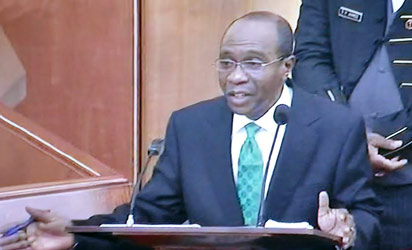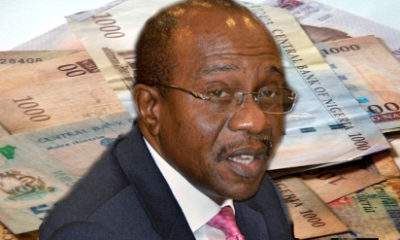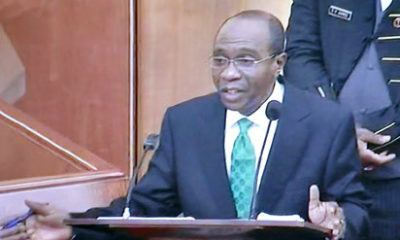Business
How A Unified Exchange Rate Regime Will Impact Nigeria’s Economy

Analysts at Financial Derivatives Company Limited have made a strong case for a unified exchange rate regime, saying this is critical to jump starting the nation’s economy. Bismarck Rewane Among other things they said that a unified exchange rate impacts the economy positively more than the current multiple exchange rate regime, which they noted creates opportunity for arbitrage and can trigger hyperinflation, as experienced by Venezuela. Noting the the number of countries maintaining multiple exchange rates has been declining since 1990s; they argued that the possibility of exchange rate convergence in Nigeria is now less remote. They made this observation in an article titled Floating Exchange Rate: A Road to Perdition – CBN (Matters Arising)”, published in the FDC Bi-monthly update. The article was in response to recent comments by the CBN Governor, Mr. Godwin Emefiele, who in his response to the presidential candidate of the Peoples Democratic Party, Alhaji Atiku Abubakar’s desire to float the naira, said that floating the naira will lead to economic perdition. Atiku’s forex policy
In November 2018, Alhaji Atiku Abubakar had the said that if elected president he would abolish the current multiple exchange regime and instead float the naira. In an interview with the Africa Report, Atiku said: “I would prefer to float the naira because I believe that will bring about a more stable exchange rate. Therefore, foreign investors are more likely to return to Nigeria and invest as much as possible. We have to create more incentives for foreign investment and relax conditionality, remove regulations as much as possible,” said. When asked about the possibility of this approach driving up inflation, he said: “There could be devaluation and there could be a lot of inflow of foreign currency into the country. The devaluation that is likely to result can be balanced with the relatively huge (sums of) foreign currency that will be coming into the country. “We had that situation prior to the departure of (former president) Goodluck Jonathan. At that time, we had a pile of foreign investment in the country, and there was stability of the naira. So people did not have to go to the central bank to look for foreign exchange because there was foreign exchange in the market and in the banks. So it could turn out to be a win-win situation.” Mr Godwin Emefiele answering questions during his screening by the Senate for Central Bank Governorship in Abuja on Wednesday Emefiele’s response The CBN Governor, Mr. Godwin Emefiele however responded saying that floating the naira as intended by Atiku is a road to perdition. “The MPC reviewed it and concluded that it would be wrong. It is as good as saying that we should go back to the era of Structural Adjustment Programme (SAP) in Nigeria,” he said. “The implication can better be imagined. It will certainly lead to capital flight, lead to massive depreciation or devaluation of the currency and ultimately to currency crisis in Nigeria and I think we should all know that it is a road to perdition to ever go in that direction”, Emefiele said during a press briefing at the end of the Monetary Policy Committee (MPC) in last month. Nigeria’s romance with fixed exchange rate Weighing on this debate, analysts at FDC said: “The CBN has used a managed-fixed exchange rate since the introduction of the Investors and Exporters foreign exchange (IEFX) window in April 2017. “Like Nigeria, most economies operate within the intermediate points of a fixed and floating ex-change rate. The slant towards either of the two regimes depends on the exchange rate policy of the country’s monetary authority and the political manifesto the government seeks to achieve. “The International Monetary Fund (IMF) is a key proponent of a free floating exchange rate due to the benefits of an independent monetary policy. However, short-term speculation and inadequate fiscal discipline continue to undermine the potentials of a free floating exchange rate. “In the 1980s, more than 85 percent of economies adopted a fixed exchange rate which was pegged against the dollar, while the dollar was pegged against gold. Very few countries adopted a free floating exchange rate, as most transactions at the time were dollar-based. Today, the paradigm shift and the emergence of new world powers have tilted the exchange rate regimes in favour of a free floating and managed floating exchange rate. Fixed exchange rate regime is quickly losing its relevance, as it now accounts for less than 13% of exchange rate regimes in the world. Unified vs Multiple exchange rates “A multiple exchange rate regime is a systemic policy tool adopted by emerging markets to pro-mote certain activities through subsidies. This price adjustment mechanism involves the use of different exchange rates for different transactions. This creates an official rate for selected trans-actions and a parallel market rate. For a unified exchange rate, only one market rate will be at play at which all transactions will be embarked on. “Nigeria currently operates a multiple exchange rate system with seven different rates and at-tempts to unify these rates have predominantly been abortive. The difference between the extreme bands has narrowed in the last half decade. This suggests that the possibility of an ex-change rate convergence is now less remote.” Former Vice President Atiku Abubakar Venezuela’s experience with multiple exchange rates Citing the experience of Venezuela as example of the dangers of multiple exchange rates, the FDC analysts said: “ Like Nigeria, Venezuela maintained a multiple exchange rate regime and its oil revenue accounts for 95 percent of forex earnings. A move to hedge against exchange rate volatility prompted the monetary authorities in Venezuela to peg its currency against the dollar. This was also complemented by a multiple exchange rate policy to subsidize importation of basic amenities such as food and medicine. “However, this created room for currency arbitrage as cabals sourced for the Bolivar at a subsidized rate and subsequently sold in the black market at a premium (forex round-tripping). The general shortage of forex and the lack of discipline led to the currency instability and the world’s highest inflation rate of 1,300,000 percent in November 2018. “Similarly, the adoption of a multiple exchange rate regime also implies that some sort of subsidy exists, which is an indirect tax. When juxtaposed with the four canons of taxations, it only meets one criterion, economy. The fact that the bourgeoisie and proletariat are charged the same makes exchange rate subsidy unfair, inconvenient and uncertain.” Way Forward Highlighting the many benefits of a unified exchange rate regime to the Nigerian economy, the FDC analysts said: “To jumpstart Nigeria’s economic growth and sustain stability, the monetary authorities need to shift from a bailout provider to a proactive reformer. This emphasizes the need to anticipate financial market developments and provide incentives for market players. “Similarly, transparency in exchange rate objectives will bolster confidence in the forex market. For instance, increasing market information on the sources and uses of foreign exchange will improve information sym-metry, a move towards efficient market hypothesis. “A well functioning forex market allows the exchange rate to respond to market forces and reduce market distortions. In order to gradually move towards a unified exchange rate, the monetary authorities need to cut the seven-tier exchange rate system considerably. “This will ease the capacity strain on manpower, and reduce compliance and enforcement costs of maintaining a multiple exchange rate. This will also reduce the pressure on Nigeria’s external reserves and the frequency of the CBN’s interventions. “A floating exchange rate remains a critical input towards achieving currency convertibility, which is poised to drive financial flows. A convertible currency also promotes international commerce and lifts barriers to investment flows. This would further deepen trade relations, improving Nigeria’s prospect to reach its potential growth rate.”






























